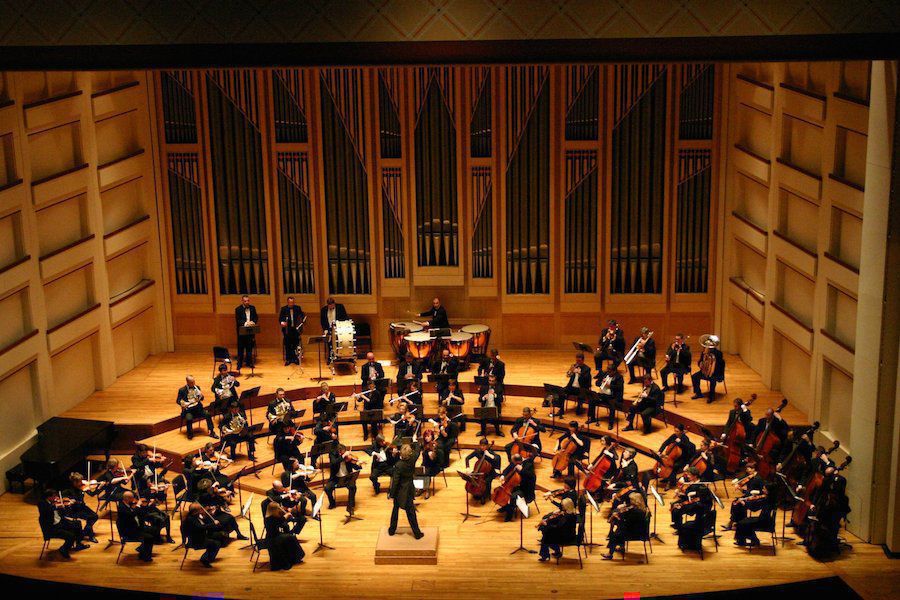3 surprising facts about the relationship between language and music
It’s often said that music is the “universal language of mankind”. Indeed, like language, music has great expressive power, and manages to convey a vast array of sentiments and emotions, even without the use of words. But just how connected are language and music? Research suggests that the relationship between the two may be even stronger than it appears at first glance. Let’s take a look at some of the surprising ways in which language and music are connected.

You’re not likely to confuse Beethoven’s Fifth for Lincoln’s second Inaugural Address, but music and language have more in common than you might think. Image via Derek Gleeson / Wikipedia
1. They share the same basic building blocks
Even on a very basic level, music and language are similar in that both are compositional. This means they are made of small parts that combine to create something larger and more meaningful; in other words, their whole is greater than the sum of their parts.
For example, languages consist of individual words that combine in meaningful ways to create sentences. In isolation, the words “I”, “you”, and “love” don’t mean much — but when combined into a sentence, “I love you”, suddenly they carry great importance.
Similarly, music — at its most basic level — consists of individual notes. Like words, these aren’t particularly meaningful by themselves: hearing an E flat in isolation likely won’t stir up any serious emotions. But when you combine the E flat with a C and a G, you have a C minor chord: something meaningful has been formed.
2. They involve the same areas of the brain
For decades, scientists have isolated specific brain regions that are responsible for the comprehension and production of language. One of the more notable regions is Broca’s area, which is located in the left-hemisphere frontal lobe and plays a crucial role in language comprehension and production. Specifically, Broca’s area seems to be responsible for our ability to use syntax —the structural rules that languages have so that sentences make sense.
Recent studies have also found that Broca’s area is crucial in the comprehension and analysis of music. Indeed, brain scans have found increased neural activity in Broca’s area when subjects heard and interpreted both speech and music. Further, research shows that, compared to non-musicians, musicians have a greater volume of grey matter in Broca’s area, suggesting that Broca’s area may be responsible for both speech and music.
3. Musical training can improve language skills

Image via Montserrat Labiaga Ferrer / flickr
In 2011, developmental psychologists from Justus-Liebig University in Germany conducted a study to examine the relationship between the development of music skills and language skills. To do this, they separated pre-schoolers into two groups, one of which received daily music lessons at school.
Later, they measured the pre-schoolers’ phonological awareness, which refers to their general ability to use and manipulate language. For example, children with good phonological awareness can recognize when words rhyme, can successfully identify individual sounds within words, and can blend together individual sounds to create words. Early phonological awareness has been shown to be a predictor of enhanced reading skills later in life.
The study found that the children who received daily music lessons ended up with higher levels of phonological awareness than those who did not. This suggests that the development of music skills and language skills go hand in hand, which makes sense if music and language are served by the same underlying brain areas.
As you can see, there are more parallels between language and music than meet the eye! On both a descriptive and neural level, language and music have a lot in common. As language learners, you can take advantage of this relationship by incorporating foreign-language music into your daily language-learning routine. In addition to providing you with great music to listen to, you’ll be exercising the same part of your brain that’s responsible for language skills.
Do you listen to music in your target language? What are some of your favorite foreign-language songs? Let us know — leave a comment!
Paul writes on behalf of Language Trainers, a language tutoring service that offers German classes in Dublin, as well as courses for other languages all throughout the world. You can check out their free foreign-language level tests and other language-learning resources on their website. Visit their Facebook page or contact paul@languagetrainers.com if you have any questions or if you’d like more information.
The power of song in language learning
Everyone has individual tips and specific techniques on how to learn a language quickly and effectively, ranging from immersing yourself in the culture of the language to listening to hours of vocabulary when asleep. During my final year of secondary school I had to learn French, to a very high standard, in around six months, so was more than willing to try any tip that people provided, however ridiculous they initially sounded. One of the most successful of these recommendations was listening to familiar songs in French. This began with Disney songs, including those from The Lion King and The Little Mermaid, and then later transitioned into pop songs ranging from Bruno Mars to Celine Dion.
 The key to this method of learning is being familiar with the lyrics, and subsequently being able to attribute each lyric you hear to the corresponding line in English. Whilst instant translation can normally be a struggle, the tune and the story told through the song aid a learner’s ability to translate much more quickly, and eventually remove the need to translate at all. By the time the song has been played for the fifth or sixth time, the language becomes familiar and instinctively understood. Listening to The Lion King on repeat for an hour, as instructed by my French teacher, means that I will never forget the word for ‘king’ in French.
The key to this method of learning is being familiar with the lyrics, and subsequently being able to attribute each lyric you hear to the corresponding line in English. Whilst instant translation can normally be a struggle, the tune and the story told through the song aid a learner’s ability to translate much more quickly, and eventually remove the need to translate at all. By the time the song has been played for the fifth or sixth time, the language becomes familiar and instinctively understood. Listening to The Lion King on repeat for an hour, as instructed by my French teacher, means that I will never forget the word for ‘king’ in French.
When learners become slightly more confident in their language, it is a great step to listen to a few songs which were originally written in the language being learnt. Obviously even the complete beginner is welcome to listen to native songs, but it can seem very overwhelming at first. Songs tend to move a lot quicker than normal conversation, and so it’s very easy to get lost in the speed of the lyrics and not take a lot in. However perseverance, as with any aspect of language learning, is key. Find a song that is relatable and enjoyable and listen to it a few times. If necessary the English translations for pretty much every song are available somewhere on the internet, and can help the initial process along. This process is how I discovered a genuine passion for French jazz, led by the multilingual Ben L’oncle Soul.
Have you incorporated songs into your language learning, or even discovered a passion for songs in another language? Let us know!
Kirsty
—
Want to join our blogging team? Email liz@eurotalk.com to find out more.
What’s so good about Eurovision?
This Saturday is the final of the Eurovision Song Contest 2014 in Denmark, with 125 million people expected to watch across Europe and beyond. The contest, now in its 59th year, has become known for its wacky performances and tends to divide opinion; while some people love it (although maybe not as much as this man), others claim to find it tacky. But I think most people can agree that whether you take it seriously or not, Eurovision is good fun. (Even if sometimes you need a drink or two to help you through it.) Here are our ten favourite things about Eurovision:
1. Russian Grannies
I had to put this first because it was one of my favourite ever Eurovision moments. The song on its own is fairly forgettable, but what made it amazing was the elderly ladies who managed to incorporate baking into their performance at the 2012 contest. I’m still not sure what it had to do with a Party for Everybody, but it was brilliant, and I’m still disappointed that it didn’t win.
2. Riverdance
The Irish dance act were first discovered when they performed during the interval of the Eurovision Song Contest in 1994. Known for its amazing synchronicity, energy and rhythm, Riverdance went on to become a worldwide phenomenon. So if you’re not a fan, now you know who to blame.
3. Romanian rivalries
In the UK, it’s not seen as very ‘cool’ to enjoy Eurovision, but some other countries take it incredibly seriously. In Romania, for example, it’s a really big deal and apparently it’s traditional for the acts to try and win a place by discrediting their opponents.
4. The voting
How could I not mention the political voting? Half the fun of Eurovision is predicting who’s going to give points to who. Greece and Cyprus usually vote for each other, as do the Scandinavian countries and the Balkans. If that sort of thing interests you, this is a useful summary. Unfortunately, the political voting tends to leave the UK in a precarious position; we often get votes from Ireland, and sometimes Malta, but not very often from anyone else…
5. The UK
While we’re on the subject, let’s take a look at the UK’s Eurovision record. It’s hard to believe looking at recent history, but apparently it’s one of the most successful countries, winning five times since our first appearance in 1957. The last win was in 1997, with Katrina and the Waves, and since then we’ve not been doing so well, finishing last three times. The first of these was in 2003, when we scored an embarrassing ‘nul points’. Apparently this year’s entry, Children of the Universe, by singer-songwriter Molly, is expected to do well. I’ll believe it when I see it.
6. ABBA
It’s not often that a Eurovision act goes on to have a successful long term career, but one exception is Swedish group ABBA. Not only did they win the contest for Sweden in 1974, they went on to sell over 380 million albums worldwide. Their music also featured in the hit film Muriel’s Wedding and the award-winning musical, Mamma Mia! (And the movie version, which introduced the world to the singing ‘talents’ of Pierce Brosnan.)
7. Alcohol is Free
Regardless of your views on drinking, it’s hard not to tap your foot along to Alcohol is Free, by Koza Mostra and Agathonas Iakovidis, a.k.a. the Greek answer to Madness. They finished sixth in 2013.
8. Finland
We love Finland; they always come up with something memorable. Last year was the catchy Marry Me, which ended with that kiss, but nothing beats 2006 entry Hard Rock Hallelujah, by Lordi. Eurovision isn’t known for its heavy metal, preferring to stick to happy songs about how we should all love each other. But the alternative approach seemed to do the trick; the band won that year’s contest.
Warning: this video contains flashing lights and monster masks!
9. Language rules
Eurovision used to have a very strict rule about countries only singing in their native language, which has been lifted and restored a few times over the years. These days, many of the competing countries choose to perform in English, but some remain loyal to their own language; France and Spain are two examples. When I was growing up, there were more songs in other languages than there are today, and we used to enjoy turning on the subtitles and watching them struggle to translate the lyrics. Songs in English have won 28 times, followed by French, with 14 wins.
10. Fairytale
This was a popular choice in the EuroTalk office. Every now and again, Eurovision does actually produce a good song, and Fairytale was the one that we all thought of. The Norwegian entry for 2009 featured violinist Alexander Rybak, and won with a record-breaking 387 points out of a possible 492. For some reason, Alexander and his dancers were also a bit of a hit with the ladies…
Have we left out your favourite thing about Eurovision? Let us know in the comments!
Liz
